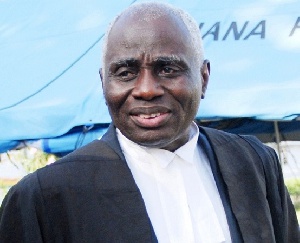The acquittal and discharge of Mr Tsatsu Tsikata by the Court of Appeal in connection with a case in which he was prosecuted and jailed by an Accra Fast Track High Court for causing financial loss to the state, is “not conclusive,” flag bearer of the main opposition New Patriotic Party (NPP), Nana Akufo-Addo has said.
“I don’t know whether the state will appeal the decision at the Supreme Court, maybe the Supreme Court will take a different answer to it but a High Court Judge of some repute, a High Court judge of some quality was the one who found that the facts assembled against him [Tsatsu] by the state were true.
“The Court of Appeal’s decision in the matter is not conclusive. It’s not the final thing. It depends on whether the state wants the matter to rest there or to take it further,” Mr Akufo-Addo, who served as Attorney General in the Kufuor administration under whose watch Mr Tsikata was prosecuted told Umaru Amadu Sanda and Evans Mensah in a joint interview with Citi FM and Joy FM on Friday, 2 December.
Asked if he was embarrassed by the turn of events, the three-time flag bearer said: “I’m not embarrassed at all, how can I be embarrassed? That is what courts do. They make a determination of innocence or guilt. …There can be no embarrassment in that matter.”
Mr Tsikata was jailed in 2008 for causing financial loss to the tune of GHS230,000.
The former CEO of the Ghana National Petroleum Corporation (GNPC) was later granted presidential pardon amidst protests and vigils organised by family and friends in connection with his incarceration.
But according to the Court of Appeal, there was a miscarriage of justice when the High Court on June 18, 2008, found him guilty on three counts of willfully causing financial loss to the state and also for misapplying public property in relation to a loan that the GNPC guaranteed for Valley Farms, a private cocoa-growing company.
After the ruling by the Court of Appeals, Mr Tsikata told journalists that "justice has been found in the court".
It is recalled that Mr Tsikata, in 2009, rejected the unconditional pardon granted him by Mr Kufuor and vowed he would continue to pursue justice in the court of law.
Describing the gesture of the former President as “the height of hypocrisy”, Mr Tsikata said: “I have never sought, and I do not need your pretence of mercy. Justice is my quest and I will pursue this quest in accordance with the constitution and laws of Ghana.”
In a two-page hand-written note to Mr Kufuor dated January 6, 2009, Mr Tsikata said: “Your apparent exercise of the presidential prerogative of mercy in respect of a conviction and imprisonment which you were the prime mover of, is the height of hypocrisy.
“The desecration of justice that was perpetrated against me in the Fast Track High Court on June 8, 2008 was at your instance, initiated in 2001 with your first Attorney-General, Nana Akufo-Addo. Nothing can divert attention from the responsibilities of the judges before whom my appeal and other legal processes are currently pending concerning my case.
“Indeed, your action in these final hours of your administration improperly interferes with these judicial processes and is clearly in bad faith. Your participation, indeed, your leading role in desecrating justice, not only in relation to me, but in many other cases, are part of your legacy as President of Ghana,” he accused.
Mr Tsikata said he was convinced that those bad examples would not endure as part of the country’s future, quoting Psalm 94 verses 15, which prophetically says: “Justice will again be found in the courts, and all righteous people will support it.”
Background
Mr Tsikata’s protracted trial began in 2002. Valley Farms contracted the loan from Caisse Francaise de Developement in 1991, but defaulted in the payment and the GNPC, which acted as the guarantor, was compelled to pay it in 1996. Mr Tsikata maintained his innocence throughout the six-year trial.
General News of Saturday, 3 December 2016
Source: classfmonline.com













